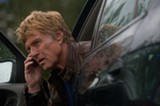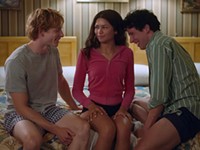[
{
"name": "500x250 Ad",
"insertPoint": "5",
"component": "15667920",
"parentWrapperClass": "",
"requiredCountToDisplay": "1"
}
]
Despite the passage of time and age, the fading of memory, no matter how many horrors blight the last several decades, the Vietnam War still haunts the American soul. It remains one of those exclusively American tragedies, a wound that may never heal, still a source of anger, guilt, and blame. Robert Redford's new movie, "The Company You Keep," provides a necessary lesson for another generation in some of the reasons for a continuing engagement with that unhappy past.
The film begins with some historical context, a montage of archival footage, newsreel, and television reports on the anti-war protests that flared up all over the nation in the 1960's and 70's, the formation of the radical Students for a Democratic Society and its subgroup, the more violent Weather Underground. Switching to color and the present day, it shows the FBI's capture of Sharon Solarz (Susan Sarandon), a Weather Underground member involved in a bank robbery 30 years before that resulted in the death of a guard; her arrest in Albany precipitates a complicated series of actions involving a great many people.
Ben Shepard (Shia LaBeouf), a zealous young reporter for an Albany paper, embarks on an investigation of Solarz's past and finds a connection to a local lawyer, Jim Grant (Robert Redford); he discovers that Grant is actually Nick Sloan, one of Solarz's former comrades. His news stories, which imply Sloan's participation in the fatal robbery, force the lawyer to take off, with both Shepard and the FBI on his trail.
Redford's direction establishes an exciting pace, constantly cutting from his character's flight from his pursuers, the FBI's use of all its technology to track him down, and Shepard's ingenious combination of dogged research, aggressive interviewing, clever persuasion, threats, bribery, and even some leaps of imagination.. At the same time, as Nick seeks out his old pals, he shows the contrasts between their lives as young radicals and their present existence.
Nick's encounters with various members of his Weather Underground cell not only suggest the differences between past and present, youth and age, but also the reactions of his comrades to his reappearance. Donal Fitzgerald (Nick Nolte), who now owns a lumberyard in Wisconsin, helps him out; Jed Lewis (Richard Jenkins), a university professor, reacts with hostility; most important, Mimi Lurie (Julie Christie), his former lover, a drug smuggler, refuses to clear his name.
Nick Sloan's travels to the Midwest and the Upper Peninsula of Michigan turn the plot into a journey into his and the nation's past. His meetings with his old friends and their discussions and reminiscences also make "The Company You Keep" something like a thriller of ideas. They not only react in different ways to his situation, but also provide a kaleidoscope of reflections on their present lives and their past involvement with a passionate and even noble cause.
In the process of his persistent efforts to find Nick Sloan, the young reporter serves as a detective, uncovering the facts of his quarry's past; as he learns from his investigation and his several interviews with a number of people, he also becomes a major character himself. He grows and learns through his pursuit, connecting with some of his interviewees, coming to understand Nick, his friends, his cause, and perhaps himself.
An actor's director, Redford employs a large and really quite remarkable cast of accomplished performers, allowing all of them to inhabit their roles fully and occupy important moments of screen time. None of them lets him down, and all of them, even in small supporting roles, act with real conviction — they appear to believe the words they utter and the emotions they express. Some of the movie's occasionally excessive talkiness probably results from Redford's background as an actor himself.
The expressions of anger, bitterness, and regret that color the dialogues between Nick and his group, however, also suggest something of the state of the nation, the way we lived then, the way we live now, with a powerful sense of sadness that nothing has really changed since those violent days in a turbulent past. If the movie addresses an earlier time, it also addresses our own time, with sorrow and disillusionment.
Speaking of...
-

Monroe County legislators take a second shot at redistricting
Mar 9, 2022 -

The realistic grief of ‘Cherry’
Apr 2, 2021 -

RoCo’s latest exhibit is a real artpocalypse
Mar 1, 2021 - More »
Latest in Movie Reviews
More by George Grella
-

Film Review: "Cake"
Jan 26, 2015 -

Film Review: "American Sniper"
Jan 19, 2015 -

Film Review: "Inherent Vice"
Jan 12, 2015 - More »






